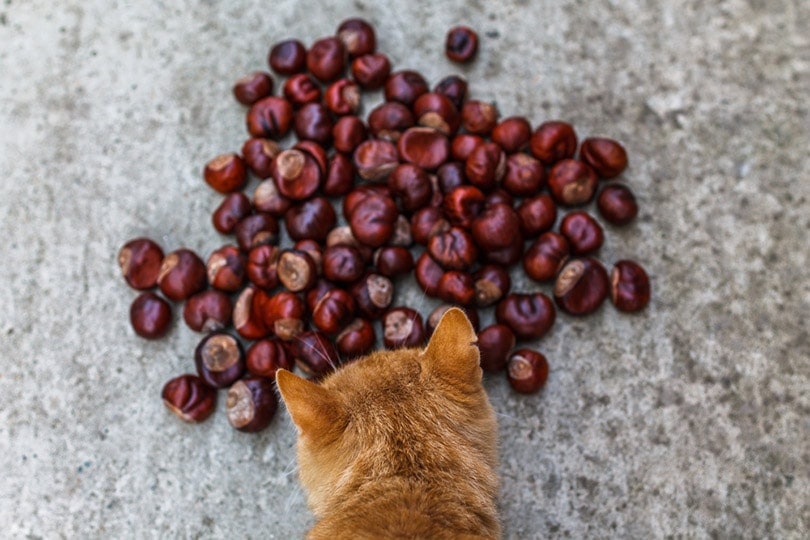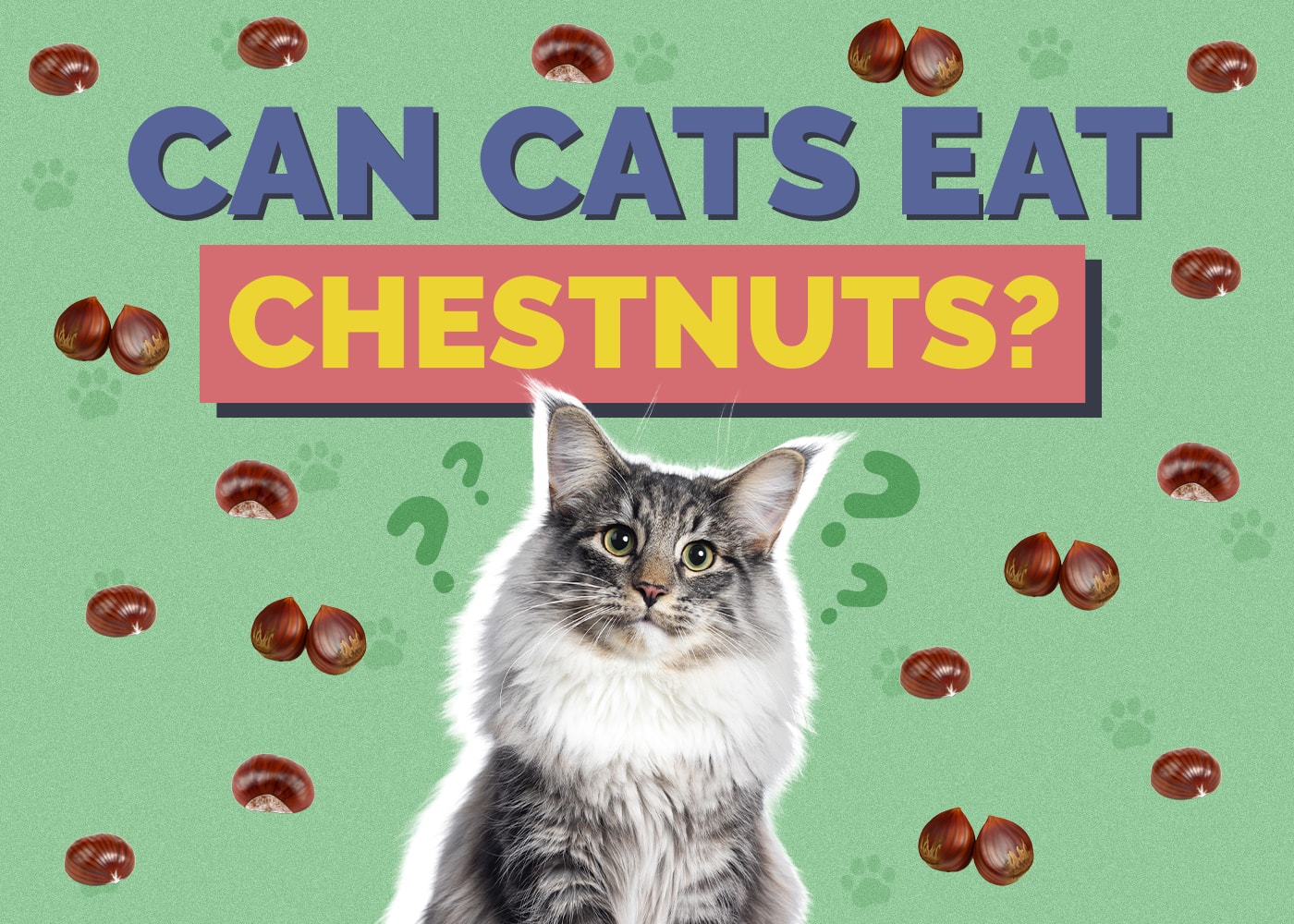Cats can eat plain American chestnuts, which are non-toxic and safe for consumption. However, horse chestnuts are toxic and should be avoided.
If unsure, it’s best to contact a veterinarian. Chestnuts are a popular and nutritious nut consumed by humans during the fall and winter months. While they may be a delicious treat, pet owners may wonder if cats can also enjoy this seasonal nut.
Providing our feline companions with a safe and appropriate diet is crucial for their health and well-being. We will explore whether cats can eat chestnuts and any precautions or advice to keep in mind when considering feeding this nut to our furry friends. By understanding the dietary needs of cats, we can make informed decisions and ensure the safety of our beloved pets.

Credit: www.hepper.com
Can Cats Eat Chestnuts?
Chestnuts are a popular seasonal treat, especially during the holidays. As a cat owner, you may wonder if sharing this festive food with your feline friend is safe. In this article, we will explore whether or not cats can eat chestnuts and discuss the types of chestnuts, safety precautions, and their nutritional value for cats.
Types Of Chestnuts
When it comes to chestnuts, it’s important to understand the different types and their potential impact on cats. The two main types of chestnuts are:
- American Chestnuts: Plain American chestnuts are non-toxic and perfectly safe for your feline friend to consume.
- Horse Chestnuts: Horse chestnuts, on the other hand, are toxic for cats and should be avoided. These chestnuts can cause digestive upset and potentially harm your cat’s health.
Safety Precautions
If you’re unsure about the type of chestnut your cat has gotten ahold of, it’s always best to err on the side of caution and contact your veterinarian. To ensure the safety of your furry friend, follow these safety precautions:
- Avoid pre-cooked chestnuts: Pre-cooked chestnuts often contain seasonings or additives that may upset your cat’s stomach. Stick to plain, unseasoned chestnuts.
- Limit intake: While plain American chestnuts are safe for cats, they have very little nutritional value and are high in carbs, which may not be ideal for their diet. Offer them as an occasional treat rather than a regular part of their meals.
Nutritional Value For Cats
Chestnuts, although safe for cats to eat in moderation, don’t provide significant nutritional benefits for them. They are high in carbohydrates and low in essential nutrients that cats require for their overall health. Therefore, it’s best to consider chestnuts as a treat rather than a dietary staple for your feline companion.
While plain American chestnuts are safe for cats to eat, it’s important to remember that they offer limited nutritional value and should be given sparingly. Always be cautious about the type of chestnut your cat may have access to, and consult your veterinarian if you have any concerns about their diet or health.

Credit: www.hepper.com
Benefits And Risks Of Nuts And Seeds For Cats
When it comes to feeding our feline friends, providing them with a balanced and nutritious diet is important. While cats are obligate carnivores, meaning their diet should primarily consist of meat, there may be times when they show interest in other foods, such as nuts and seeds. As a responsible pet owner, it’s essential to understand the benefits and risks of feeding cats nuts and seeds.
Toxic Nuts For Cats
Certain nuts can be toxic to cats and should be avoided. The most notorious nut in this category is the macadamia nut. The exact mechanism of toxicity is unknown, but macadamia nuts can cause digestive upset and potentially pancreatitis in cats. Keeping macadamia nuts and any products containing them out of your cat’s reach is crucial.
Considerations For Feeding Nuts To Cats
While some nuts may not be toxic to cats, it’s essential to exercise caution when offering nuts as a treat or including them in their diet. Nuts like almonds, pecans, and walnuts are rich in oils and fats, which can cause digestive upset in cats. Additionally, nuts are high in calories and can contribute to weight gain if consumed excessively.
If you decide to offer your cat nuts, it’s crucial to take the following precautions:
- Only offer plain nuts without any seasonings or additives.
- Start with a small amount and monitor your cat for any adverse reactions.
- Avoid salted or roasted nuts, as the added salt and oils can harm cats.
Remember, while nuts may seem like a tasty treat for you, they should only be given to your cat in moderation and occasionally. Always consult your veterinarian before introducing any new food into your cat’s diet.
Attracting Wildlife With Chestnuts
If you’re a nature enthusiast looking to attract wildlife to your backyard, you might be surprised to learn that chestnuts can play a role in enticing various animals. Chestnuts are not just a delicious snack for humans but also a nutritious and enticing food source for many wildlife species. In this article, we’ll explore the benefits of using chestnuts to attract wildlife and the different animals that can’t resist these tasty treats.
Chestnuts As Wildlife Food
When it comes to attracting wildlife, chestnuts are a reliable food source many animals can’t resist. Chestnuts provide a balance of nutrients that nourish different wildlife species and contribute to their overall health. Whether you have a bird feeder or prefer to create a natural habitat, incorporating chestnuts into the mix can make your backyard a haven for various wildlife.
Animals That Eat Chestnuts
1. Squirrels: Squirrels are notorious for their love of chestnuts. These energetic little creatures will happily munch on chestnuts throughout the day. The high protein and fat content in chestnuts help squirrels maintain their energy levels and prepare for the winter months.
2. Deer: Chestnuts are a favorite food of deer, especially during autumn. Deer find chestnuts incredibly palatable, and eating them provides the necessary nutrition to support their growth and development.
3. Chipmunks: Chipmunks have a penchant for chestnuts, which they hoard in their cheek pouches and store for later. These small mammals benefit from the carbohydrates and protein found in chestnuts, which help them thrive in their natural habitat.
4. Wild Turkeys: Wild turkeys are known to relish chestnuts, particularly during the fall and winter. Chestnuts provide valuable sustenance to these birds, helping them stay strong and healthy.
To attract these delightful creatures to your backyard, consider scattering chestnuts in areas where wildlife frequently visits. This way, you can provide them with a tasty and nutritious meal while enjoying the enchanting sights of various animals coming to feast on your chestnut offerings.

Credit: petcube.com
Frequently Asked Questions Of Can Cats Eat Chestnuts
Can I Give Chestnuts To My Cat?
No, cats should not be given chestnuts as they have very little nutritional value and can be high in carbs. Stick to cat-approved foods for their health and safety.
What Nuts Are Toxic To Cats?
Cats should not eat macadamia nuts as they are toxic. Other nuts like almonds, pecans, and walnuts can cause digestive upset and potentially pancreatitis. Plain American chestnuts are safe for cats, but horse chestnuts are toxic and should be avoided.
It is always best to consult your veterinarian if unsure.
Are Chestnuts Poisonous To Animals?
No, chestnuts are not toxic to animals. Plain American chestnuts are safe for cats to consume. However, horse chestnuts should be avoided as they are poisonous. If in doubt, it’s best to consult with a veterinarian.
Can Animals Eat Chestnuts?
Animals can eat chestnuts, but it’s important to note that horse chestnuts are toxic. Stick to plain American chestnuts, which are non-toxic and safe for animals. Chestnuts are popular for wildlife like deer, squirrels, chipmunks, and wild turkeys.
Conclusion
While chestnuts are safe for cats to eat, it’s important to ensure that they are plain American chestnuts and not horse chestnuts, which are toxic. Chestnuts should also be given in moderation as they have low nutritional value for cats and are high in carbs.
As always, if you’re unsure about the type of chestnut or any other food your cat has consumed, it’s best to consult your veterinarian.

